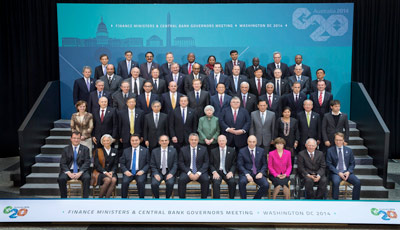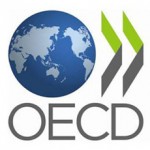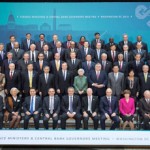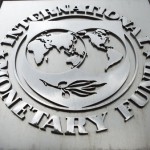G-20 Plans $2 Trillion Growth Boost to Uneven Global Economy

Group of 20 leaders agreed to take measures that would boost their economies by a collective $2 trillion by 2018 as they battle patchy growth and the threat of a European recession.
Citing risks from financial markets and geopolitical tensions, the leaders said the global economy is being held back by lackluster demand, according to their communique following a two-day summit that ended yesterday in Brisbane. The group submitted almost 1,000 individual policy changes designed to lift growth and said they would hold each other to account to ensure they are implemented.
With policy makers facing domestic challenges to implementing their deregulation and investment plans, immediate impact from the communique was limited. Stocks (MXAP) sank in Asian trading, hurt in part by a surprise report from Japan that the world’s third-largest economy tipped into a recession — adding to gloom over Europe’s challenges and China’s jump in bad loans.
“The G-20 plan to boost global growth is long on ambition but short on specifics,” Frederic Neumann, co-head of Asian economics at HSBC Holdings Plc in Hong Kong, said in an e-mail. “What needs to be done to revive global growth is clear: structural reforms. Trade is one such area where more concrete steps could have been laid out.”
Stocks Fall
The MSCI Asia-Pacific Index fell 0.7 percent to 140.73 as of 11:19 a.m. in Hong Kong. Futures on the U.S. Standard & Poor’s 500 Index were down 0.5 percent.
“There are some worrying warning signs in the global economy that are threats to us and our growth,” U.K. Prime Minister David Cameron said after the G-20 meeting ended. “If every country that has come here does the things they said they would in terms of helping to boost growth,” including trade deals, then growth will continue, he said.
Action to bolster growth comes as policies around the world are diverging with the U.S. tapering its monetary easing as it boasts the strongest economy among advanced nations, while Europe and Japan add further stimulus to ward off deflation. The International Monetary Fund last month cut its projection for world economic growth next year to 3.8 percent.
Encouraging Trade
The mostly structural policy commitments spelled out in each country’s individual growth strategy include China’s plan to accelerate construction of 4G mobile communications networks, a A$476 million ($417 million) industry skills fund in Australia and 165,000 affordable homes in the U.K. over four years.
IMF Managing Director Christine Lagarde told the leaders that in order to avoid the “new mediocre” of low growth, low inflation, high unemployment and high debt, all tools should be used at all levels, she said at a press conference yesterday in Brisbane.
“That includes not just monetary policy, which is being significantly used, particularly in the euro zone, but also fiscal policy, structural reforms and, under certain conditions, infrastructure,” she said.
The IMF and Organisation for Economic Co-operation and Development assessed the policy commitments and said they would raise G-20 gross domestic product by an additional 2.1 percent from current trajectories by 2018, according to the communique.
‘Worthy Objective’
“It’s a worthy objective for the G-20 as global growth is still lagging,” said Shane Oliver, Sydney-based head of investment strategy at AMP Capital Investors Ltd., which manages about $125 billion. “But a lot of those measures might not be fully implemented and, even if they do, they may not deliver the results.”
The G-20 also agreed to establish a global infrastructure hub, based in Sydney, with a mandate of four years that would encourage the exchange of information among governments, the private sector, development banks and other international organizations, according to the communique.
“With the global economy struggling with an uneven recovery, we welcome G-20 leaders’ commitment to raising growth and delivering quality jobs,” World Bank Group President Jim Yong Kim said in a statement. “G-20 leaders have rightly identified investment in infrastructure as crucial to lifting growth, creating jobs and tackling poverty.”
IMF Restructuring
IMF reform to give emerging economies more equal representation remains a priority and leaders are “deeply disappointed” with delays in implementing changes agreed in 2010, according to the communique. The G-20 urged the U.S. to ratify the changes, and said if it does not happen by the end of the year it would ask the IMF to provide other options, according to the communique.
Leaders of the BRICS nations — Brazil, Russia, India, China and South Africa — said Nov. 15 that delays in the IMF reform are “unjustifiable” and called on the G-20 to consider alternatives.
G-20 chiefs also pledged to do “what is necessary” to try to eradicate Ebola and address economic and humanitarian costs from the outbreak. The group welcomed an IMF initiative to make available a further $300 million to stem the outbreak and ease pressures on Guinea, Liberia and Sierra Leone, through a combination of concessional loans, debt relief and grants.
Source: Bloomberg – G-20 Plans $2 Trillion Growth Boost to Uneven Global Economy





























